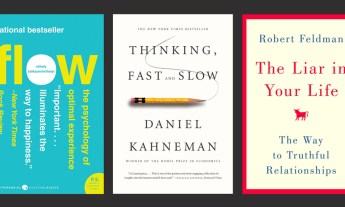
In her blockbuster TED Talk, Susan Cain has a call to action: Take introverts seriously, and understand what they can do in the right environment. Ben Lillie called her up for an extended conversation about the terrors of public speaking, how her issue is one of civil rights, and the neuroscience behind personalities.
What was it like giving a TED Talk, as opposed to some of the other talks you’ve given?
It was a lot scarier, for one thing.
So how did you get through that?
Well, there was “How did I prepare for it?” and then “How did I get through it when it was really happening?” One of the things I did, which I wouldn’t usually do, is I worked with a coach for the week beforehand. Partly just for the moral support of preparing when somebody is there. But also, the coach did this really smart thing: I had told him at the beginning that I’m comfortable talking with people one-on-one, but the whole thing of performance on a stage, a red-carpeted stage, freaks me out a little bit. And he said, “You’re going to go through your TED Talk as if it were a regular conversation.” And that’s what we did. It really, really helped, because it got me more emotionally comfortable with the words. It felt more like it was me, as opposed to this other creature who was supposed to be the performer.
I tried to bring that with me, even when I was standing under those lights. I was also trying to talk as if it were just me talking. But it’s funny, if you ask me, “What was it like to be actually standing up there and delivering it?” I don’t know, because it was such an otherworldly experience that I can’t remember it exactly. I know I was there. I know that much. But the details kind of escape me.
The best part of the experience was not the moment of being up on stage — it was the aftermath. I was lucky to be one of the earlier speakers. That meant that all week long I got to talk to people one-on-one about how they had reacted to what I’d been saying. And that was really, really special.
What were some of your favorite reactions?
It was like a heightened version of what I experience in real life. All these people were coming up to me and saying that I had been speaking for them to some extent. They told me their stories of their struggles with being introverted in an extroverted world. We’d get to talking about what they do for a living, and very often these were CEOs and people who had founded companies, and yet, here they were talking about their emotional and personal struggles. That’s always been the amazing thing for me with this topic, that it touches so many people and people don’t usually talk about it.
Your book, Quiet, got a huge reception. Your TED Talk got a huge reception. Which makes me wonder, What is it about now? Why are we just having someone spread this idea now? What was it that kept it from coming out before?
I actually don’t know. I think that this book could have been written ten years ago and it probably would have gotten the same reception. I think that these things have been bubbling up for a really long time.
I would say this about now: We have a mania for all things collaborative. The word collaboration has taken on a kind of sacred dimension. Collaboration can be a wonderful thing, obviously; I just think we’ve gone crazy with it, we’ve gotten lopsided with it, so we’re at this moment when many people are working in open-plan offices. They’re spending all their days in meetings. You can’t pick up a business magazine ever without seeing the word collaborate splashed all over it. I think people are probably feeling assaulted by the need to always be on and always be interacting. So people are seizing anything that gives them permission to say, “No, I actually want to go off by myself. And that’s okay, and that’s going to benefit everybody.”
At the same time, we’re seeing the rise of this idea that Sherry Turkle (TED Talk: Connected, but alone?) presented, that we’re becoming more alone and separated by technology. I almost wonder if the collaboration mania is a reaction to that.
It’s funny, I see it as a little bit the reverse. I think the reason that texting is as popular as it is, for example, is because people feel so much like they need to be on all the time. Texting is a great escape from that. You can be connecting, but you don’t have to be on. It’s not face-to-face, it’s asynchronous. I take Sherry Turkle’s point. I think there are versions of our use of technology that are distancing and alienating. But I think the reason why we’re embracing it as much as we are is in reaction to the other extreme.
Have you heard stories from offices or schools of people implementing some of your ideas?
Yeah, yeah, I have. There’s a school in Chicago, it’s a school for gifted children, it’s a private school, and they told me they’re rethinking their entire curriculum now. I’m actually hearing this all over the place.
One thing I’m hearing a lot is from teachers who have felt that there’s something wrong with the extreme group learning, but felt like they couldn’t say that out loud. And apparently the discussion is now opening up. I think change is going to be a long time coming. There are apparently core standards that many states have adopted for public school teaching, and those standards very strongly advocate group learning. But on an individual level, teachers are starting to question it.
I’m also hearing a lot of stories of people questioning their open-plan office design. In fact, right after I gave my talk, I had a meeting with Jim Hackett, the CEO of Steelcase. He was in the audience and he was really enthusiastic about all these ideas and is really interested in rethinking offices so that they will have more private spaces to act as a balance to the open communal spaces. So it’s really exciting to see it all in action. And I think that, within a few years, we’ll see real concrete changes.
Have you ever been to the TED office? It’s very open.
I know! I actually talked to Chris [Anderson] about it when I came in. To me, it’s too much. I think there should be some of that kind of communal space in offices, I just think it’s out of whack [at your office]. If you go to the Google office, the Google New York headquarters, it’s interesting. It’s a little too open for my taste, but still it’s balanced in a really lovely way. They have a library where people actually go and take naps and read books. They have lots of different cafés. There’s one café that’s really busy. There’s another one that’s quieter and you can sit quietly with your laptop. It’s just quite thoughtful, with a lot of different nooks and crannies to escape to.
Very cool.
It’s easier when you have a lot of money to splash around, though I think there are probably ways to do it even with less money to spend.
You mentioned the word balance. And I know some of the pushback you’ve gotten is from people who think you’re saying extroversion is bad — which is not what you’re saying. But I’m wondering how much of the stance you’re taking is pendulum pushing, where the pendulum is so far over you need to just shove it back.
I think that’s part of it. All personality traits have their good side and their bad side. But for a long time, we’ve seen introversion only through its negative side and extroversion mostly through its positive side. What I’ve been doing to some extent is reversing that, so we can have a fuller picture. I’m trying to point out: Well, there are some things about extroversion that are actually not so great, and you need an introvert in the picture to counterbalance them, and here are all the good things about introverts. My goal is for us all to have a fully balanced picture and a real synergy between the two types.
The other analogy I would make: Look at the early days of the women’s movement, where people were raising consciousness about women’s issues for the first time. And at the time, some people were saying, “Women are just trying to get rid of men; they’re saying men are no good.” But other people were saying, “No, we’re really not saying that. We love men. We just want a level playing field.” And that’s really, honest to God, what I’m saying. I love extroverts. I just want more balance between the two.
So if these are the early days, what’s the end game? What’s the goal you’re shooting towards?
The first thing is consciousness-raising. I think people’s attitudes need to change at a deep psychological level about how they view these different personality styles. For introverts particularly, to get rid of the guilt and the shame that they feel about who they are, but also for how the world looks at them.
As far as the world is concerned, I’ll give you three concrete places where it needs to change. Number one is in the establishment of psychology itself. What I do in my research, I was actually amazed at how biased psychology is against introversion. I expected it not to be that way because so many psychologists are introverts themselves. But I think it’s just the nature of the field that it mirrors whatever the biases are at the current time. So it used to be biased against homosexuality, biased against introversion and other stuff too. Right now, for example, they’re in a process of revising the diagnostics manual. And the last I heard is they’re considering an entry for something called introverted personality disorder. And that, to me, is just appalling.
Wow.
So we need to change in the field of psychology. And then the other places are schools and workplaces.
With schools it’s two things. Number one: consciousness raising. I think we need to do widespread education of teachers about what temperament really is, so that their reaction to introverted children is not, “Oh, here’s someone who I need to make more extroverted.” Definitely, introverted kids need some help coming forward. It’s like they have a longer bridge to cross before they get to their comfort level, and teachers can be helpful in getting them to cross that bridge. But it shouldn’t be “Here is a defective extrovert,” it should be “Here is a wonderful child and we’re approaching them on their terms.”
And then, same thing at the level of work. We need a workplace that equally values the thoughts of people who are quiet and outspoken, and gives people different styles of working. So if extroverts want to be working in a more rambunctious, more social environment, great. And if introverts want to be in the corner, peacefully chugging out their creative output, let them do that too.
You’re raising awareness about a type of people for which there is no external marker. It’s something that you have to be told about, something that you don’t wear outwardly, and that isn’t even, for a lot of people, a core part of who they conceive of themselves, in the way that sexuality is. Are there challenges in raising awareness about something we don’t externally display?
Good question. There really are two types of introverts, in a way: the kind where you just know right away that they’re introverts, and the kind who, as you say, they seem like extroverts, but they’re really not. And because of that, it can seem like we’re talking only about a very small group of people, and that can make it seem less pressing to address. If you’re a manager at work, you might feel, well, we’re just talking about a few people here, so I’m not going to rethink my entire office plan just to benefit these three people. You don’t realize there’s a whole host of other people who feel this way; they’re just really skilled at hiding it, maybe even from themselves. Truly, the most recent statistics suggest that half of the population is introverted. If you understood it that way, the need to act would feel all the more pressing.
It’s the most unlikely people who come up to me and tell me they’re truly introverts and are faking it. I get letters all the time from people who tell me how exhausted they are, people who are running companies or running departments or whatever they’re doing. And they said, “Nobody would ever guess who I really am. I’m just skilled at putting on a kind of show when I’m at work to get my job done.” But that can take its toll over time, and I think we’d be so much better off if we didn’t have to spend so much time acting out of character like that.
Do you get those from politicians too?
No, not so much. I don’t know if they just haven’t reached out to me in particular, now that I think about it.
I was wondering if maybe it is a more extroverted field, or maybe just because they’re a politician they can’t even write the private letter.
Yeah. They might just think it’s not a good thing to do politically. I do think politics is more of an extrovert’s game, but I also think there are some introverts in politics. And Obama’s probably an introvert, but I doubt he’s going to write me a letter. So there you are.
If he ever does, I want to hear about it.
Robert Rubin, who was the Secretary of the Treasury under Bill Clinton, is an interesting character. If you read his memoir, he never uses the word introvert to describe himself, but the self-portrait he draws is quite introverted. He talks about how on Capitol Hill there’s always this jockeying for who’s going to sit at what place in the table. Everyone wants to sit in the power spot at the table, as close to the president as they can get. And he said that he always felt most comfortable sitting off on the sides and more on the margins of the table. He didn’t worry that he would be overlooked. He felt that, from that place, he could always speak up and say, “Mr. President, this is what I think.”
One of the problems in the workforce now is that one of the ways to get ahead is by going out and talking to people and making connections; at some level, opportunities come about from random conversations you have with strangers. Do you think that it creates a real imbalance for whether introverts can advance. And yet, is that unavoidable? Could we imagine another way of structuring the workforce that that isn’t what happens?
It’s not that there’s anything wrong with the things you just mentioned. The only real issue is the lopsided issues that we’re in right now. So when you think of the whole imperative to be out and meeting people and networking and how that advances your career, all of that’s true and all of that’s fine; what’s not fine is when you then feel this pressure to “Oh, I have to go and work the room.” There are all these directives like “Never eat alone.” Have you ever heard that one?
Thankfully, no.
Yeah, I forget who said that one, but it’s one of these guru people. And that might be right for some people, but I think there’s a different model for how to make those connections, how to be networking. I was talking yesterday to somebody about this — I don’t know if I’m at liberty to say the name, but the CEO of a really major company — and he was describing himself as someone who’s really good at building alliances behind the scenes. He’s not so good in a meeting. He doesn’t talk that much in meetings. He tends to hide behind his laptop. But he’s really good at forming these quiet connections. There are a lot of ways of doing things, and yet, the only one that is counted is the very extroverted model. And I know from my own self, whenever I go to a cocktail party or networking event, my goal is really to just make a connection with pretty much just one person who I really, really like and I know I’m going to keep in touch with. And if I’ve met that one person, I feel like it’s been a success. Maybe I’ll meet others too, but it doesn’t really matter at that point.
You have a lot in your book about what research we have and what we do know about introversion. Are we getting to a point where we’re understanding some of the neurophysiology?
We’re still at the very beginning of it. And part of the problem is it’s so hard to define what an introvert is, it sometimes seems like the studies are working with different cohorts of people.
But putting all that aside, yeah, there are a few things that we know. One of them is the sensitivity to stimulation. There’s a whole host of studies that seem to suggest that introverts, on the level of the brain and the nervous system, are just more reactive to stimulation of all kinds. And so that’s why they function at their best and are the most energized in these quieter environments, because that’s the level of stimulation that is right for their nervous system. I think that has pretty profound implications for how we set up our social institutions.
The other thing that we know is that our brains see things called reward networks. These are the parts of our brains that get us excited and jazzed about pursuing rewards. It could be anything from striking a business deal to striking up a conversation with an attractive person. It seems as if extroverts have stronger reward networks than introverts do. Introverts have them also, but extroverts’ tend to be a little stronger. And when your reward networks are activated, it tends to be accompanied by a whole host of really joyful emotions. I call them champagne bubble emotions. It’s a kind of exuberance. And it’s probably this, often, that makes extroverts really delightful company. So that’s the lovely side of extroversion. When you’re really oriented towards rewards in that way, what they’re starting to show in the lab is that you’re less likely to see other stuff coming your way, including warning signals that things may not be working out.
And so introverts tend to take a more balanced, more circumspect view of life around them. So it can be a great thing that extroverts take the risks, but on the other hand, they get into more car accidents, they commit adultery more often, they place larger financial bets. It’s a whole profile in risk and reward, each with its own set of pros and cons. And it’s interesting because it all derives from this neurochemistry.
So the flip side to that is you frame a lot of what you’re talking about as almost a civil rights issue.
Yeah.
Do we even need to understand the neurophysiology for that? It’s fascinating and it’s interesting, but is there some argument that we should just — whatever the science says, introverts are people.
Yeah, that’s an interesting thing. In a way that’s the whole question in general: So what’s the point of understanding the neuroscience of what makes us who we are? I don’t know. I do find that stuff useful. I’ll give you an analogy. If you’re talking about gay rights, I think it somehow is useful to the civil rights argument to be able to say, for a lot of gay people this is what they’re born with or this is something that’s physiological and that they can’t change; this is who they are. I don’t know why that’s compelling from a civil rights point of view, but I believe that it is. And I think that the same thing is true here. I guess what it is, is that otherwise there’s this sense that if the person wanted to be participating more in meetings, they would just do it — it’s seen as a failure of will or as a kind of laziness. That’s actually some of the push back I get occasionally from corporate leaders. They’ll say, “I don’t need you to give excuses to my introverts to be lazy.” Wow, that is such a profound misunderstanding of who these people are and how they could be contributing. And I think that if you understand it all at a physiological level, it can somehow help with that.
You made a reference in your book to the orchid effect, which is the idea that there are some things in an evolutionary pool that respond very differently than the bulk of people, and that somehow introversion plays in as one of these traits that becomes very useful in unusual circumstances. I’m fascinated by the idea that, in evolution, we’re learning that traits out of the norm can be wildly useful to success.
Yeah, the whole orchid effect hypothesis is so incredibly fascinating. It’s basically this idea that there is some small percentage of the population that’s more reactive to experience of all kinds. So when things don’t go their way, if they have a painful childhood, they’re much more likely to wilt than another kid would. But if they have a good childhood, they’re really reactive to that experience too, and they do even better than another child. So kids who are born with a sensitive, more introverted temperament tend to fall into this category.
You can see this across the animal kingdom. You’re talking about evolution in general. If you look at almost every single species in the world, you will find that a percentage of them are “introverts.” They’re like animal introverts. These animals adopt a strategy that’s more careful. They’re more on the sidelines when predators come around. They’re less likely to be caught because they’re not out there in the fray. But on the other hand, when food is scarce, they have more trouble because they’re less exploratory than another animal would be. Once you start seeing it through the prism of the animal kingdom and then you start looking at human children, you realize we’re just exactly like the monkeys or the fish. We’re all the same — and not just that we’re all the same, but that both types are really key to the survival of the species.
I should tell you about this one really interesting experiment. There’s one evolutionary biologist named David Sloan Wilson. He went to this pond full of pumpkinseed sunfish, and he dropped a trap in the middle of the pond. And what he found was that the bolder, more extroverted fish came racing towards the middle of this pond to see this trap because they were curious what was going on. And so he trapped them right away. And had the trap been a real predator, those were the fish that would have been eaten. And the introverted fish who were hovering on the sidelines of the pond, he couldn’t catch them at all. So they were the ones in that situation who totally survived. But then later on he came back with a net, and he caught the introverted fish and he brought them back to his lab where the extroverted fish were already waiting for them. And in that setting where it was a function of how do you survive in this new and alien environment, there the extroverts did better, just the way they do among humans, right. Extroverts tend to be much better at feeling comfortable right away in a new environment, whereas introverts usually have to go through that warmup period that feels so uncomfortable.
So there you are, we’re just like the fish, and we each thrive in different scenarios. In humans though, it extends to intellectual functions too. Introverts and extroverts, they have the exact same I.Q., but introverts tend to do better academically, because they have this more careful, more sitting still type of style, and that just lends itself well to sitting down and working through a problem and not giving up and being really persistent about it. They tend to be more persistent at those kinds of tasks. There’s some basic level where you can understand that as an evolutionary progression from the fish up to the 12th-grader who does really well in exams.
So, for me, the line in your talk that stood out the most was when you said that “Just because you’re the best speaker doesn’t mean you have the best ideas.” How intentional was that, to say that line in that room?
In a room that prizes good speakers? Well, a little bit intentional, but honestly, that’s one of the core messages of the book. And it’s not only about the best talker, it’s about the most assertive talker. That’s really the issue, that we follow the most assertive talkers. And I just think that’s a disaster for so many realms of society. If you imagine a jury, let’s say. Imagine that your life or the life of somebody you care about is in the hands of a jury. And imagine that you know, if you now choose to follow the opinions of the most assertive talker, whether they’re right or wrong. That’s frightening when you think about it.
This piece was originally published on the TED Blog in June 2012.
Featured image courtesy iStock.











